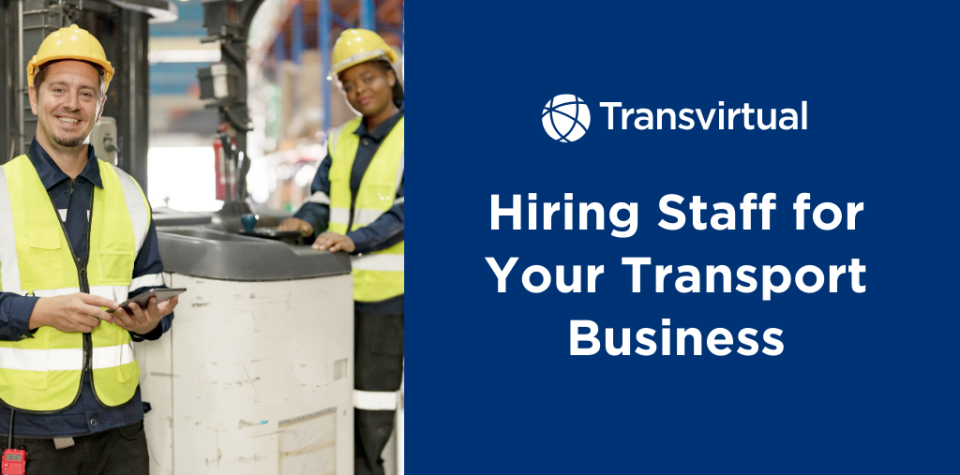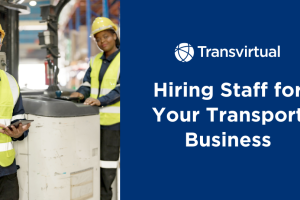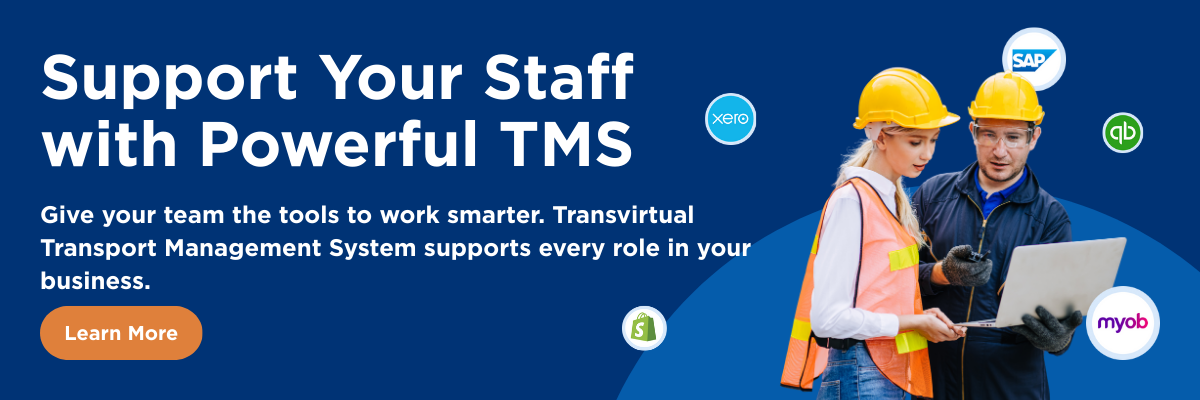Table of Contents
In the transport industry, the secret isn’t just having great equipment. It’s having the right people behind the wheel and beyond. Your drivers might be the face of your business, but they’re just one piece of the puzzle. You need a solid team working together.
Good staff keep your operations running smoothly, your customers happy, and your business growing. Without them, even the best fleet can’t deliver results.
Let’s break down exactly who you need on your team to drive real success.
Core Personnel of Your Transport Business
These are the essential team members who keep your transport business running day-to-day. They form the backbone of your operations.
Drivers
Hiring the right drivers is crucial to your business success. Without them, your trucks don’t move, your deliveries don’t happen, and your customers don’t get the service they’re expecting.
You need people who are more than just licensed to drive. A great driver is safe and reliable. They’re the face of your business on the road and often the only team member your customers meet in person. Professionalism, good communication, and a positive attitude go a long way in building trust and repeat business.
Of course, compliance is non-negotiable. Make sure your drivers hold the correct licenses for the vehicles they operate and stay up to date with regulatory requirements. Ongoing training in areas like road safety, fatigue management, and load handling not only keeps your team compliant but also reduces risks and improves efficiency.
Transport Manager
While your drivers are on the road, your transport manager makes sure everything works smoothly behind the scenes.
Their biggest responsibility is coordination. They are the link between drivers, customers, and management to make sure everyone is on the same page. If a delivery is delayed, a vehicle needs maintenance, or a customer has a special request, it’s often the transport manager who steps in to find a solution. Their problem-solving skills keep small issues from turning into big disruptions.
Compliance is another critical area. A good transport manager ensures your business meets all safety and regulatory requirements, from driver working hours to vehicle maintenance schedules. This not only protects your business from costly fines but also keeps your staff and customers safe.
Admin Staff
While they might not be on the road or managing logistics directly, admin staff are the ones handling the critical tasks that keep your business running day to day. Think paperwork, invoicing, payroll, and compliance documentation. These are all the details that can quickly pile up if not managed properly.
Admin staff free up your managers and drivers to focus on running operations and delivering goods. Instead of spending hours chasing paperwork or sorting through accounts, your frontline team can stay on the road, and your managers can concentrate on strategy and efficiency.
They are also key to compliance. They make sure records are accurate, deadlines are met, and that your business stays aligned with industry regulations.
Specialised Transport Business Roles to Support Your Growth
Specialised roles support efficiency, growth, and customer satisfaction beyond the basics. They help your business scale.
Dispatchers
Dispatchers are the coordinators who keep your fleet moving efficiently. They are the ones guiding drivers to make sure every load is delivered on time and every route runs as smoothly as possible. They create and adjust schedules, match the right driver to the right job, and track progress in real time.
A big chunk of their role involves problem-solving. In transport, unexpected issues like traffic delays, vehicle breakdowns, weather disruptions, or last-minute customer requests are part of the game. Dispatchers are the ones who step in, rerouting drivers, updating customers, and finding solutions to keep deliveries on track.
Good dispatchers also act as a vital communication link. They keep drivers informed, customers updated, and managers aware of what’s happening across the fleet.
It’s easy to confuse the responsibilities of a transport manager and a dispatcher, but their roles are distinct. Transport managers oversee the overall transport operation, ensuring long-term compliance with safety rules, licensing requirements, and regulatory standards at the business level.
In contrast, dispatchers focus on the day-to-day and real-time coordination of vehicles and drivers. They communicate with drivers throughout each shift, make immediate routing decisions, and ensure individual jobs stay on schedule.
Mechanics
It’s important to ensure that your trucks are always ready to hit the road. You need a skilled mechanic to keep your fleet safe, compliant, and roadworthy.
Your mechanics are not only there to fix what’s broken. Preventive servicing helps identify issues early, reducing the risk of breakdowns and extending the life of your vehicles. This proactive approach not only saves money in the long run but also keeps your drivers safe and your business compliant with industry regulations.
In addition to routine servicing and repairs, mechanics handle safety checks and certifications. They also keep detailed records of all work done, which is essential for meeting compliance standards. For smaller businesses, you may not need a full-time mechanic. Outsourcing or using trusted service providers can be a cost-effective option until your fleet grows.
Supply Chain Specialist
If you’re just starting in the transport industry, you don’t need to hire a supply chain specialist right away. But as your business grows, the complexity also levels up. You might need to handle multiple warehouses, suppliers, and contractors as your deliveries increase in number.
Supply chain specialists are the experts who make complex transport operations run efficiently.
They analyse routes, monitor delivery times, and identify opportunities to reduce costs while improving service. They also manage inventory levels, making sure the right products are in the right place at the right time, which helps prevent stockouts or overstock situations that can hurt your bottom line.
Supply chain specialists also act as a bridge between your business and external partners. From negotiating contracts to monitoring supplier performance, they ensure that your operations stay reliable and cost-effective.
Sales and Marketing
A strong sales and marketing team is essential for growing your transport business. This team focuses on bringing in new contracts, building relationships, and expanding your reach in a competitive market. They are the ones who ensure your business thrives.
Sales staff identify opportunities, pitch your services, and secure contracts that match your capabilities. They also maintain ongoing communication with clients, making sure your service stays top of mind and encouraging repeat business.
Meanwhile, marketing professionals handle your branding and reputation. In a crowded industry, a strong brand can set you apart, showing customers that your business is reliable, professional, and capable of meeting their needs. Even smaller transport businesses benefit from having at least one dedicated person or outsourced support handling sales and marketing.
Part-Time or Seasonal Employees
Part-time or seasonal employees are a flexible solution for transport businesses that experience fluctuations in demand. During peak seasons, special projects, or unexpected surges in deliveries, having extra hands on board can keep operations running smoothly without overloading your core team.
These employees can step in to support drivers, admin staff, or even specialised roles, depending on where the pressure points are. For example, during busy periods, part-time drivers can help meet delivery targets, while temporary admin staff can manage increased paperwork.
Using part-time or seasonal workers also helps control expenses. You only bring them in when needed, reducing overheads while maintaining service quality. This flexibility ensures your business can respond quickly to demand without committing to permanent staff costs.
Finally, part-time and seasonal employees can become a valuable talent pool for the future. By working with them during busy periods, you can identify reliable, skilled workers who may eventually transition into full-time roles as your business grows.
Putting People First: Key to Transport Success
Take a close look at your current team and identify where extra help or specialised roles could truly make a difference. Act now to build a workforce that not only keeps your business running, but sets it up to succeed for years to come. Don’t wait—your future success starts with a proactive staffing plan.
Technology can make this even easier. Software solutions like Transvirtual Transport Management Solution and other logistics solutions reduces overhead, streamlines workflows, and minimizes the amount of manual work your staff has to do. From route optimization to automated scheduling and compliance tracking, a TMS gives your team more time to focus on what matters most.
Think about where your business is now. Start there, and combine smart staffing with technology to build a transport business that’s efficient, scalable, and ready for growth.


